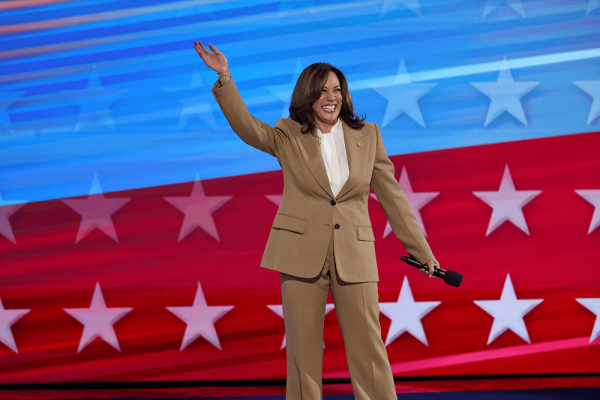While evangelical political engagement remains solidly in favor of Republicans, a group of evangelical leaders are organizing their support for Vice President Kamala Harris and Gov. Tim Walz in the upcoming presidential election.
Evangelicals for Harris was originally formed as “Evangelicals for Biden,” to support President Joe Biden in 2020 and 2024. Rev. Jim Ball, who founded the group, said he did so as it became increasingly apparent that Donald Trump’s presidency threatened democracy, and he wanted to support the Democratic candidate.
“I was like, I can’t just be on the sidelines. I’ve got to get in the fight,” Ball told Sojourners. “I’m personally an independent. I’ve voted for Democrats and Republicans, but Mr. Trump is a totally new thing for our country.”
As the 2024 elections approached, Ball decided it was time to step up again, believing that “the threat was even more dire.” The organization was originally a 501(c)(4) but has recently transitioned under the umbrella of the Evangelicals for America political action committee. Ball has enlisted the support of evangelical leaders like Jemar Tisby, Lisa Sharon Harper, Dwight McKissic, Ekemini Uwan, and Democratic Texas State Rep. James Talarico.
Evangelicals for Harris is attempting to walk a fine line between supporting a candidate because of their faith and tying their faith to that candidate or party. They describe the Harris-Walz ticket as best aligning with Jesus’ teachings, while writing on their website, “No political party or leader can ever hold our full devotion. That belongs to Jesus alone.” They highlight Harris’ achievements alongside Biden, Harris-Walz’s policy proposals, and her personal faith story.
The campaign claims over 200,000 supporters have signed their pledge to pray and vote for Harris-Walz, which Ball says is the largest independent evangelical effort ever to support a Democratic presidential campaign. The group focuses on reaching a racially diverse evangelical audience, particularly targeting voters in Michigan and Georgia. Through social media ads, Zoom meetings with guest speakers, and a $1 million investment in video advertisements, the group spreads messages emphasizing both the perceived weakness of Trump and strengths of Harris.
Zoom rallies and theologies of voting
The Zoom calls feature a range of speakers, from writers and religious leaders to activists and politicians, all advocating for Harris as the best choice in this election. Most of the speakers have consistently expressed disagreement with Trump and urged evangelical voters to take a holistic approach when evaluating candidates — examining their values and policies beyond a single issue. Speaking in the first Evangelicals for Harris Zoom call, Tisby advocated for a “thick” rather than “thin” political theology that prioritizes maintaining a democracy rather than a theocracy.
In the same Zoom call, Baptist pastor Dwight McKissic emphasized the importance of voting for the most qualified candidate rather than adhering to traditional expectations. He acknowledged that while evangelicals have historically been expected to vote Republican, and he himself has primarily done so in the past, this election demands a different approach. McKissic argued that evangelicals should prioritize a candidate’s qualifications over party affiliation or longstanding voting patterns.
“If one were basing their vote solely on the basis of which party, or which candidate was the best moral choice, one would have to conclude: ‘There is none righteous, no not one,’” McKissic wrote on X, formerly Twitter. “As Jesus said, ‘Those among you without sin[cast the first vote].’ We’d all have to drop our ballots if sinless perfection were required to vote.”
Ekemini Uwan, a public theologian and human rights activist who hosted the Zoom call, highlighted efforts to recruit evangelicals of color as part of the Evangelicals for Harris coalition.
“There is no way [Harris] can get in the White House without us,” Uwan said in an interview with Sojourners.
Reflecting on the initial Zoom call, Uwan said she believed the racial diversity of Evangelicals for Harris was an asset in showing that the coalition is “something different” than outreach in other elections. “I think people were surprised by the representation in that call,” she said.
The racial diversity, she said, can help challenge the conception that “evangelical” means white and conservative.
Dislodging evangelical support for Republicans
If Evangelicals for Harris can help shift movement away from the Republican party, it would be a return to an era of weaker political and religious alignment, according to Marie Griffith, a professor at Washington University in St. Louis specializing in American Christianity. Evangelicals did not strongly align with the Republican Party and conservative policies until the 1980s, with this association solidifying during Ronald Reagan’s presidency. Over time, it became an almost unspoken rule that evangelical loyalty belonged to the Republican Party, she said. Yet in recent years, Griffith said a shift seems to be occurring within evangelical circles, with people of all ages increasingly voicing dissatisfaction with conservative policies and the overall direction of the government.
“Younger evangelicals, in particular, seem more open to the idea of justice, something deeply rooted in Jesus’ life and teachings,” Griffith said of her research. “It really feels like it could break open that old stronghold of ‘religious equals conservative Republican.’”
However, the true impact and power of the evangelical voting bloc remains to be seen in the upcoming elections. A recent study conducted by the Pew Research Center continues to indicate that white evangelicals still predominantly lean Republican, while Black protestants tend to favor the Democratic party.
Nonetheless, previous elections have shown that such voting patterns can shift. Evangelicals for Harris’ decision to target Michigan and Georgia is strategic. In the 2020 presidential elections, select counties within both of these states proved crucial for Biden’s victory. For instance, in Georgia, where white evangelicals comprise about 35 percent of voters, Biden increased Democratic support among this group by 9 percentage points compared to 2016. Similarly, in Kent County, Michigan, an evangelical stronghold, Biden received 50,000 more votes than Hillary Clinton did in 2016.
As Evangelicals for Harris targets these states, evangelicals who oppose Trump hope these past trends suggest potential for further shifts in the future.
Got something to say about what you're reading? We value your feedback!






